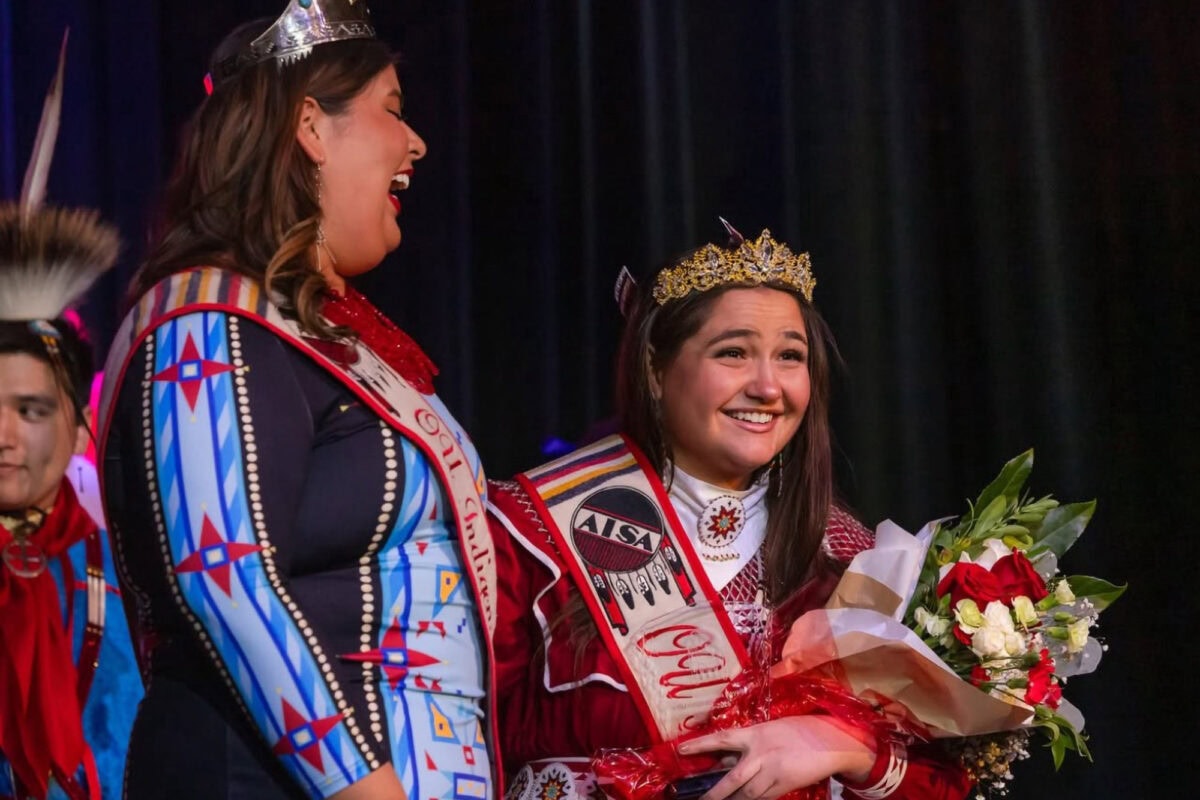For Choctaw Nation tribal member Leandra LeForce, embracing her culture has defined both her identity and her ambitions.
She was crowned Miss Indigenous OU April 6 and now represents Native students at the University of Oklahoma, sharing her love for her people and their traditions.
Before earning this title, she served as the Choctaw District 1 Princess, where she proudly represented her district and learned valuable lessons that continue to resonate with her long after her reign ended.
At OU, LeForce found a welcoming Native community that helped her rediscover her culture.
Encouraged by peers, she entered the Choctaw District Princess pageant.
What began as a hesitant step into cultural involvement evolved into a personal transformation that brought her peace and a sense of belonging.
“The more I engaged with the culture, the more I fell in love with it,” said LeForce. “I found a piece of myself that had always been missing, and that it was just always there for me to reach out and accept and embrace.”
Now in her final year of her master’s degree in regional and city planning,
LeForce’s academic path mirrors her passion for building stronger, more sustainable tribal communities.
Her goal is to become a tribal urban planner focused on improving infrastructure and environmental resilience in Indian Country.
Growing up in Idabel showed her the need for stronger infrastructure and environmental planning to protect tribal communities for future generations.
Winning the Miss Indigenous OU title earlier this year was a significant milestone in her journey, representing much more than just a crown.
For LeForce, it symbolized her growth from a hesitant contestant in the Choctaw District Princess pageant to a leader who represents Native students at one of Oklahoma’s largest universities.
She described the moment she won as emotional, representing years of practice, self-discovery and growth that culminated in one night.
“It just meant so much to me,” she said. “It was years in the making. Learning my culture, growing in confidence, finding my place.”
While LeForce now represents the university’s Native community, she credits her success to the support of family and mentors.
Her mother, whom she describes as her best friend, guided her through every step of the pageant process.
Former royalty also provided her with valuable guidance and encouragement.
LeForce believes that this mentorship embodies one of the greatest strengths of Native communities: the passing of knowledge from one generation to the next.
Her platform, Accessible Environmental Sustainability, connects her studies with her Choctaw values.
It focuses on helping college students and tribal citizens find easy, practical ways to care for the environment and their communities.
“My platform is about making sustainability accessible,” Leforce said. “But it’s also about cultural sustainability. Environmental sustainability is Choctaw. Language preservation is Choctaw. Futurity is Choctaw.”
She hopes to bring environmental education programs to Idabel and other Choctaw communities, showing how protecting the land also helps protect tribal culture.
“Sustainability is more than just the environment,” she said. “It’s more than just carbon emissions and renewable energy. It’s the sustainability of our tribes that also has to do with sustaining our cultures.”
Serving as Miss Indigenous OU has also helped her see what it truly means to represent her people.
“I used to think representation was just about showing up,” LeForce said. “But when you’re in this role, you realize you’re standing for more than yourself. You’re standing for your ancestors and everyone who might be helped by your voice.”
Hearing from elders has been one of her favorite parts of this journey.
“It’s so humbling when elders tell me their hopes for the next generation,” she said. “It makes you realize the importance of what you’re stewarding when you’re in this title.”
According to LeForce, being Choctaw means belonging to a people whose strength comes from perseverance, faith and community. That belief drives her commitment to sustainable development and to preserving the culture that gave her strength.
“My favorite thing about being Choctaw is the people,” she said. “It’s because of them that I want to fight for the future of our tribes, for the collective well-being of all these amazing people. I’m so grateful for my roots, where I grew up and everything that put me on this journey.”
As she prepares to complete her degree and continue her work, LeForce hopes her story will encourage other Choctaw youth to pursue their goals confidently and reconnect with their culture along the way.
“I hope younger tribal members who are our future, I hope that it can ease any anxieties that they have around achieving their particular goals, because I am, at the end of the day, just another girl from Idabel.”
